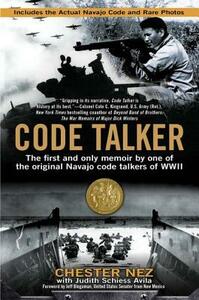Take a photo of a barcode or cover
emotional
informative
inspiring
fast-paced
adventurous
emotional
informative
inspiring
sad
medium-paced
Chester Nez was one of 29 Navajo who served in the marines as "code talkers," starting in WWII. As of the printing of this edition in 2011, he was the only surviving member (he died at 93 in 2014).
I don't really like war books as a genre. I didn't like the recounting of personal encounters with war in this book either. What I liked were the small history lessons about Japan, how/why he joined the marines, and what his life was like before and after. I also found it ironic that the boarding schools inflicted so much violence on the Indigenous to scrub their languages and cultures out (which, to me, is a form of emotional, psychological, and cultural genocide), yet it was their very language that was used to help win in WW2.
So I guess it was a good thing the schools didn't completely succeed. Those schools - the other half of the genocide being cultural and religious imperialism - make me so angry! But because the Navajo and others who survived the schools found a way to hold onto the essence of who they are, this story reminds me to keep fighting the forces that try to squash us down and strip away our multicultural identities that actually make this country great.
I was really saddened by the impact of the government oppression on his family and community, but I knew to expect that coming into the book - no surprise there.
Good read. About time the code talkers got their due recognition. Their story is something that should be shared and told throughout the generations as part of US history - all of it - their contributions, but also the before (i.e., the boarding schools), the after (e.g., the Congressional Gold Medal), and all the racism they've had to overcome in between - not to make anyone feel badly about our history, but to face it, learn from it, and grow from it to become a stronger nation.
Thank you to my Goodreads friend Theresa for recommending this book!
I don't really like war books as a genre. I didn't like the recounting of personal encounters with war in this book either. What I liked were the small history lessons about Japan, how/why he joined the marines, and what his life was like before and after. I also found it ironic that the boarding schools inflicted so much violence on the Indigenous to scrub their languages and cultures out (which, to me, is a form of emotional, psychological, and cultural genocide), yet it was their very language that was used to help win in WW2.
So I guess it was a good thing the schools didn't completely succeed. Those schools - the other half of the genocide being cultural and religious imperialism - make me so angry! But because the Navajo and others who survived the schools found a way to hold onto the essence of who they are, this story reminds me to keep fighting the forces that try to squash us down and strip away our multicultural identities that actually make this country great.
I was really saddened by the impact of the government oppression on his family and community, but I knew to expect that coming into the book - no surprise there.
Good read. About time the code talkers got their due recognition. Their story is something that should be shared and told throughout the generations as part of US history - all of it - their contributions, but also the before (i.e., the boarding schools), the after (e.g., the Congressional Gold Medal), and all the racism they've had to overcome in between - not to make anyone feel badly about our history, but to face it, learn from it, and grow from it to become a stronger nation.
Thank you to my Goodreads friend Theresa for recommending this book!
emotional
hopeful
informative
inspiring
reflective
medium-paced
While I didn’t get to meet Mr. Nez personally, I attended a Veterans Day program in which he was the honored guest. His story is a great one.
These men were absolutely amazing. A fantastic story (although the writing itself could have been better)
4.5 stars
Chester Nez was one of the original 29 Navajo Code Talkers who not only served as a Code Talker, but was one of the ones that created the code used in WWII and remained unbroken until it was declassified in the late 1960s.
This is is autobiography of his life living just off the reservation, having to attend boarding school where they tried to erase the Navajo language from him, to joining the Marines and finding that his fluency in both Navajo and English was invaluable to the war effort, to returning home and not being able to talk about his experiences, to eventually being recognized for how he and his fellows were the ones that stemmed the tide to victory in the Pacific.
++++
It's hard to rate a person's experience and story. But I found myself gripped by the telling and moved by his experiences. I am glad he lived to see his efforts recognized and rewarded and I am sad for those that did not.
We should never forget.
Chester Nez was one of the original 29 Navajo Code Talkers who not only served as a Code Talker, but was one of the ones that created the code used in WWII and remained unbroken until it was declassified in the late 1960s.
This is is autobiography of his life living just off the reservation, having to attend boarding school where they tried to erase the Navajo language from him, to joining the Marines and finding that his fluency in both Navajo and English was invaluable to the war effort, to returning home and not being able to talk about his experiences, to eventually being recognized for how he and his fellows were the ones that stemmed the tide to victory in the Pacific.
++++
It's hard to rate a person's experience and story. But I found myself gripped by the telling and moved by his experiences. I am glad he lived to see his efforts recognized and rewarded and I am sad for those that did not.
We should never forget.
Very interesting read. I'm also grateful that the audiobook included an interview with Chester Nez & the author at the end. Knowing he passed away in 2014, it was very cool to witness that record of him talking a bit about his own life in his own voice.
This book was important in that it told a story that was buried for so long. It just didn’t ring all of the bells for me.
What I liked: The beginning where Nez talks about his childhood on the checkerboard in New Mexico was super interesting. I loved the way that he told the stories of herding sheep, and he provided an interesting perspective on the relationship between the Navajo people and the government. The stories were funny and he explained pieces of Navajo culture in a really accessible way. His stories about his relationship with the other Code Talkers were fascinating and his day to day experience in the war was a mix of funny and poignant. I also really enjoyed the part about his life after the war, especially when he talked about the files getting declassified and being able to share his story with other people.
What I didn’t like: I’m not that into books about war so the battle scenes kind of dragged on for me. Like I didn’t care about the draft of the boats or the types of planes or guns. I think this part of the book was just not so much for me. I also had a hard time with the fact that he’s still so patriotic, even when he get back from the war and experiences some pretty terrible racism. He definitely comes across as someone who is willing to overlook a lot of nonsense from the country he loves. It wasn’t all in a bad way, but some of it was a bit hard to swallow. The only other thing that didn’t always work for me was the language sometimes. It sounds like a guy from the 50s wrote it. Because he did. So just go into it with your eyes open that he’s going to use the word “buddies” a lot and describe about half of the original Code Talkers as tall, skinny, with a good sense of humour.
Overall, I liked the book, but the writing style and the battle scenes made it a little less than perfect for me.
What I liked: The beginning where Nez talks about his childhood on the checkerboard in New Mexico was super interesting. I loved the way that he told the stories of herding sheep, and he provided an interesting perspective on the relationship between the Navajo people and the government. The stories were funny and he explained pieces of Navajo culture in a really accessible way. His stories about his relationship with the other Code Talkers were fascinating and his day to day experience in the war was a mix of funny and poignant. I also really enjoyed the part about his life after the war, especially when he talked about the files getting declassified and being able to share his story with other people.
What I didn’t like: I’m not that into books about war so the battle scenes kind of dragged on for me. Like I didn’t care about the draft of the boats or the types of planes or guns. I think this part of the book was just not so much for me. I also had a hard time with the fact that he’s still so patriotic, even when he get back from the war and experiences some pretty terrible racism. He definitely comes across as someone who is willing to overlook a lot of nonsense from the country he loves. It wasn’t all in a bad way, but some of it was a bit hard to swallow. The only other thing that didn’t always work for me was the language sometimes. It sounds like a guy from the 50s wrote it. Because he did. So just go into it with your eyes open that he’s going to use the word “buddies” a lot and describe about half of the original Code Talkers as tall, skinny, with a good sense of humour.
Overall, I liked the book, but the writing style and the battle scenes made it a little less than perfect for me.
adventurous
emotional
informative
reflective
fast-paced
One of the best memoirs I've ever read. Fascinating, tragic, hopeful.




